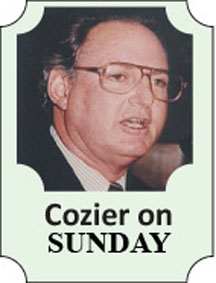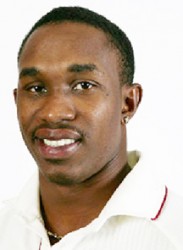BEGGING Her Majesty’s pardon for applying her poignant, well known phrase to the game of cricket; it is just that it seems particularly appropriate in this instance.
In 1992, Queen Elizabeth II declared that it was “not a year on which I shall look back with undiluted pleasure.
“In the words of one of my more sympathetic correspondents, it has turned out to be an ‘annus horribilis’”, the British Monarch commented after her particularly horrible year. West Indies cricket won’t look back on 2014 “with undiluted pleasure” either; it has been its ‘annus horribilis’.
 It began with the dismissals, in the space of three months, of Test captain Darren Sammy and head coach Ottis Gibson.
It began with the dismissals, in the space of three months, of Test captain Darren Sammy and head coach Ottis Gibson.
Sammy had pleaded, after crushing Test defeats in India and New Zealand, that “we definitely cannot continue like this”; he gave way to Denesh Ramdin and immediately quit Test cricket.
Gibson, fired on the phone by West Indies Cricket Board (WICB) president Dave Cameron the day before the start of a home series against Bangladesh, is yet to be replaced.
Clive Lloyd, an iconic figure, was appointed head of a rejigged selection panel. He followed the “West Indies first” policy, dictated by the Pybus report to the WICB directors that prioritized commitment to the regional team over domestic T20 franchise tournaments elsewhere.
It immediately eliminated the crafty spinner Sunil Narine from the home series against New Zealand after he missed the cutoff date for joining the team camp by choosing to remain for the final of the Indian Premier League (IPL).
The problems were later compounded by Narine’s suspension after two international umpires deemed his action suspect during the Champions League in India and by Darren Bravo’s “personal problems” that led him to pull out of South African tour in December. It was the classy, 25-year-old left-hander’s second such withdrawal for the year, a worrying trend.
The eerie emptiness of stands for series against New Zealand and Bangladesh that once teemed with fans even for regional cricket was confirmation of a public disenchanted by the 20 years of beatings and bickering.

The complete absence of publicity and promotion for the new, highly trumpeted Professional Cricket League (PCL), described by Cameron as “a revolutionary introduction into the West Indian cricketing landscape…that will transform West Indies first-class, List A and international cricket” suggested that the WICB itself had all but given up.
As disheartening as all such troubles were, they were suddenly reduced to irrelevancy by West Indies cricket’s most severe crisis in its long and chequered history.
It was triggered by the unprecedented and calamitous premature exit of the team from its scheduled tour of India in October after a conflict between the WICB and the players over new contracts, presented to them on

arrival in Delhi.
With one ODI, one T20 and three Tests abandoned, an incensed Board of Control for Cricket in India (BCCI) held the WICB responsible and served it with an unlikely claim for U$42.9 million in compensation for losses incurred.
Entering 2015, it hangs ominously over a virtually bankrupt organisation.
Seeking reasons for the fiasco, the WICB commissioned an independent Task Force to investigate and report. It concluded that the parties involved – the board itself, the West Indies Players Association (WIPA) and the players – were equally culpable.
The WICB’s dithering over how to respond required political intervention to broker a provisional peace treaty. It was a familiar pattern.
At a meeting at the Hyatt Hotel in Port-of-Spain, arranged by prime minister Ralph Gonsalves of St.Vincent and the Grenadines, it was accepted that there would be no “victimization or discrimination” against the 14 who quit India. Cameron was among those who attended.
True to the accord, seven from India, among them captain Denesh Ramdin, were picked for the three Tests in South Africa a couple of weeks later.
The flames of controversy remained flickering and flared once more when Dwayne Bravo, captain and chief spokesman for the players in India, Kieron Pollard and Darren Sammy (later belatedly included) were dropped from the subsequent ODI matches.
Jason Holder, 23, was appointed as Bravo’s successor, the youngest of all West Indies captains; it was a daunting assignment with the World Cup to follow South Africa.
An angry Gonsalves predictably saw the switch for what it was, a betrayal of the commitment made at the Hyatt meeting. In a letter to Cameron, he called it “a travesty of justice…that reeks of village vengeance, discrimination and victimization”.
The issue yet again pitted a prominent leader of a Caricom member state and by extension, Caricom itself, and the head of the organization in charge of the only sport that has encompassed the entire English-speaking Caribbean for more 114 years.
With such a divide, and with the BCCI closely monitoring events from afar, it is difficult to see how West Indies cricket can be dragged out of the quagmire without compromise and conciliation between the antagonists. So far, there has not even been a hint of such an approach.
Gonsalves has made his position clear. His influence in Caricom is strong.
“The days of men riding horses with cork hats across plantations, are, metaphorically, over,” he seethed in his letter to Cameron. These are emotive words in a region with a history of slavery.
“The WICB must stop functioning as a virtual private club and be responsible and responsive to the people of the region,” he added.
Charles Wilkin, the Queen’s Counsel from St.Kitts who headed the WICB’s governance committee until the directors rejected his commissioned report on its restructuring, echoed recommendations that Caricom governments “use their leverage to force the board to become relevant”.
“If not, the time is not long when the other cricket countries will relieve West Indies cricket from its misery and force it into permanent second class status,” he contends. “That would certainly kill cricket as a regional institution.”
It is an opinion gaining increasingly wider currency, if not within the WICB.
At the height of the turmoil in India, Cameron, in the presidency for less than a year, defiantly tweeted: “They’ve criticized you. They’ve doubted you. They’ve lied on you. They’ve done all they can do, but one thing they can’t do is stop you”.
It sounded as if he saw the issue as not so much about West Indies cricket as about him personally. Yet he has the backing of his directors.
It has developed into a case of an irresistible force up against an immovable object. The lingering presence of the BCCI’s substantial claim is the only likely way of forcing them to budge.
For all the upheavals off it, results on the field remained much as they were.
The narrow, disappointing 2-1 loss to New Zealand, one above them in the ICC Test rankings, and the clean sweep over Bangladesh, one below them, were contests against like opponents. The gap between them and South Africa, the present kings of Test cricket, was evident in their overwhelming first Test defeat in December by an innings and 220 runs.
Whatever the series, they continued to pay dearly for missed chances and and feeble late order batting. The upshot is that the already modest bowling, diminished further by the ankle injury in his 16th over that put Kemar Roach out of the South Africa Tests, lacks the necessary support of sizeable totals and sharp fielders.
Mercifully, it was not all doom and gloom. Some encouraging advances came from the young brigade.
Kraigg Brathwaite, 22, accumulated significant scores against each opponent with the impressive solidity and concentration of the conventional opening batsman – 129 against New Zealand, 212 against Bangladesh and 106 against South Africa. His 77.55 average from his six Tests for the year was only below those of Joe Root, Angelo Matthews and Steve Smith, other players of the future.
At the start of his Test career, Holder showed the makings of the all-rounder West Indies have missed for so long.
Half-centuries against New Zealand, Bangladesh and South Africa by Jermaine Blackwood, 23, indicated an emerging middle-order batsman. Five years on from his Test debut, Shannon Gabriel, a strapping 26-year-old, started to add control to his 140 kph pace.
What they, like West Indies cricket itself, now need is stability from a properly administered board. Ends.






